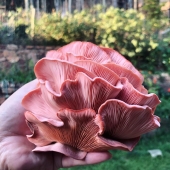


6 Ways To Keep Chickens - pdf download
will be released to subscribers in:
soon!



 1
1




An eficient way to heat your structures info below
https://permies.com/wiki/63928f371/Wood-Heat-DIY-Rocket-Mass









Invasive plants are Earth's way of insisting we notice her medicines. Stephen Herrod Buhner
Everyone learns what works by learning what doesn't work. Stephen Herrod Buhner
 2
2





 2
2




 2
2




Kena said, "So researching the specific type of mycellium for your plants and trying to source that could be an option.
That said, compost can't hurt, and it's likely to be a medium where the naturally occuring mycellium is likely to thrive.
Anne said, 'How does Dr. Ingham's Soil Food Web suggest building the soil to make it fungal?
Invasive plants are Earth's way of insisting we notice her medicines. Stephen Herrod Buhner
Everyone learns what works by learning what doesn't work. Stephen Herrod Buhner





Some places need to be wild

 3
3




Anne Miller wrote:
How does Dr. Ingham's Soil Food Web suggest building the soil to make it fungal?
Andrew Schrieber wrote:My understanding that fungal dominated soil communities arise out of two dynamics associated with communities of woody plants.
1. White-rot fungi are better at breaking down Lignin (woody material) than bacteria. Where woody mulch/inputs prevails, fungi will tend to be a primary decomposer.
2. Woody plant communities tend to have a much more carbon rich soil, where nutrients are more dispersed. Fungi can transport themselves WAY FASTER than bacteria. Soils that are bacterially dominant tend to to be more nutrient dense around the root zones of plants, because the bacteria can't move through the soil as fast. i.e. They require worms/insects to help transport them.
How Permies works: https://permies.com/wiki/34193/permies-works-links-threads
My projects on Skye: The tree field, Growing and landracing, perennial polycultures, "Don't dream it - be it! "

|
You've gotta fight it! Don't give in! Read this tiny ad:
Learn Permaculture through a little hard work
https://wheaton-labs.com/bootcamp
|



